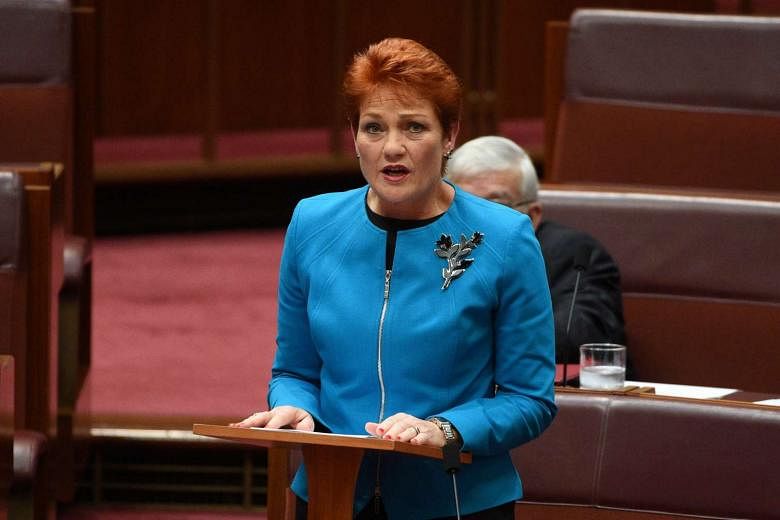Australia is proving to be the latest country experiencing a rise of populist political sentiment, with opinion polls suggesting that support for the nation's mainstream parties has plunged to an historic low.
In a worrying sign for both the ruling Liberal-National Coalition and the opposition Labor Party, the latest Fairfax-Ipsos poll this week found more than a third of voters support minor parties and independents - the highest on record.
The main beneficiaries of this backlash against the major parties have been the Greens, on the left, Ms Pauline Hanson's anti-migrant One Nation party, on the right, and the centrist, protectionist Nick Xenophon Team (NXT).
The survey of 1,403 people found 16 per cent backed the Greens, up from 10 per cent at the last election in July, and 18 per cent supported "other" small or independent parties, up from 13 per cent. Support for the Coalition was 36 per cent, and Labor, 30 per cent.
These findings, backed up by recent election results, have led to concerns that Australian voters are increasingly willing to abandon the established order and step into the political unknown.
Analysts have likened the trend to other recent populist uprisings which led to the election of Mr Donald Trump as United States president and to Britain's decision to leave the European Union.
Political commentator Peter Hartcher said that Australia was experiencing "the breakdown of traditional loyalties, and the rise of voter disenchantment". "Minor parties and independents have profited," he wrote in the Sydney Morning Herald.
"This is consistent with the rise of fringe parties and populist parties across the Western world."
This disenchantment has occurred despite a relatively strong economy. Unemployment is at the historically low level of about 5.6 per cent and the country has enjoyed 25 years of continued growth.
Analysts have attributed the backlash to recent political instability in Canberra, as well as concerns in some parts of the country about the impact of free trade and the decline of the manufacturing sector.
Dr Zareh Ghazarian, an expert on Australian politics at Monash University, believes the trend is driven largely by a backlash against Canberra's long-term push for global free trade. This has led to rising support for protectionist parties on both the left and right of the political spectrum, he said.
"There is a growing sense that Australian governments have rolled over in the face of trade liberalisation," he told The Straits Times.
"Neither of the major parties in Australia will seek to centralise the economy or to wipe out liberal ideals - but minor parties will."
At each of the past four elections, support for minor parties rose - from 15 per cent in 2007 to 23 per cent at this year's election in July when One Nation won a surprising four seats in the 76-member Senate, and NXT, three.
But the major parties have done little to help their own cause.
Both Labor and the Liberal Party have endured humiliating leadership crises in recent years, involving the unusual ousting of three sitting prime ministers.
Labor leader Kevin Rudd was deposed by Ms Julia Gillard in a party- room coup in 2010. He ousted her three years later. In 2013, Liberal leader Tony Abbott was elected with a pledge to finally end Labor's leadership "circus" but he was deposed by Mr Malcolm Turnbull just two years later.
In addition, the Greens have cemented themselves over the past two decades as a stable third force in Australian politics. The party captured about 10 per cent of the vote at recent elections, much of which was at Labor's expense.
Dr Ghazarian said the populist trend will probably continue, especially as the manufacturing industry experiences further declines.
"The concerns are strong in outer metropolitan areas, where people are concerned about jobs for future generations and the economic climate," he said. "It is pushing people to look at alternative parties."
Australia has not yet recorded a full swing towards the populist fringe, but some commentators believe it is a possibility, particularly if the economy were to take a turn for the worse.
"Australians are well into the disengaged phase," said political commentator George Megalogenis in The Monthly magazine.
"All it would take to tip them into a Brexit or Trump mindset, a white rage against globalisation, is a deep recession."

